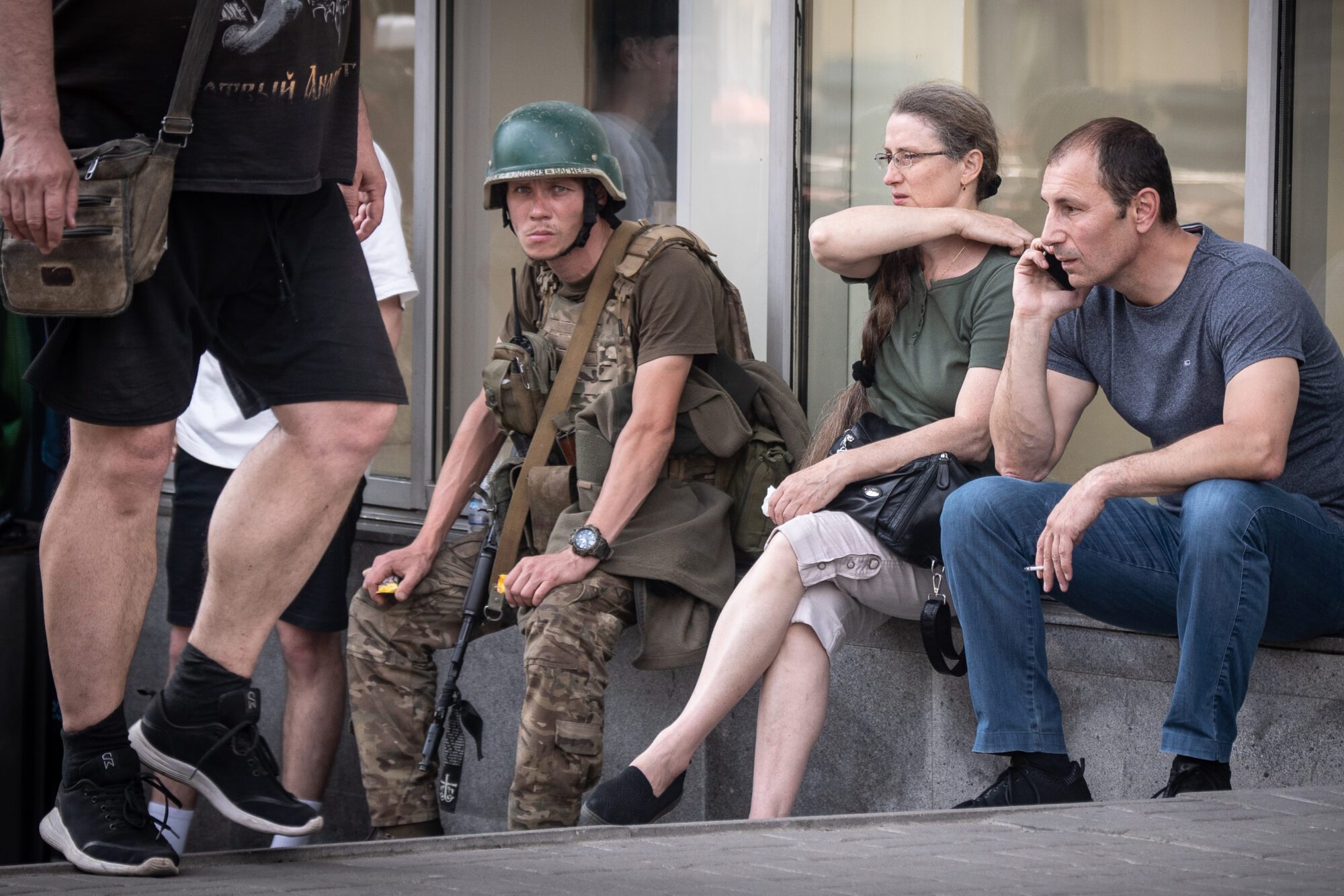
A member of Wagner group sits among local residents in a street in the city of Rostov-on-Don on June 24, 2023.
ROMAN ROMOKHOVAFP / AFP / AFP AFP
Just over twenty-four hours into a military coup, in a peculiar turn of events, the Russian Federation on Saturday, June 24th, averted an apparent downward spiral into civil war as Wagner Group boss Yevgeny Prigozhin and his troops aborted their mission to topple Russia’s military leaders, leaving journalists, analysts, and commentators speculating as to what really happened.
Kremlin spokesman Dmitry Peskov late Saturday evening announced that Belarusian President Aleksandr Lukashenko helped to broker a deal between the Russian state and Prigozhin that swiftly brought an end to the armed mutiny that saw columns of Wagnerites seize strategic logistical hubs and come within a few hundred kilometers of Moscow, the Russian state-backed news agency TASS reports.
“Avoiding bloodshed, internal confrontation, and clashes with unpredictable results was the highest goal,” Peskov told reporters.
Under the deal, Prigozhin agreed to halt Wagner’s tank advance on Moscow and withdraw his troops from the occupied city of Rostov in exchange for the FSB (Federal Security Service) dropping the criminal case of “incitement to rebellion” that had been filed against him. Prigozhin additionally received personal assurances from Putin himself that he would be able to leave Russia for Belarus and that his safety would be guaranteed.
Additionally, the agreement states that the paramilitary forces who took part in what Putin called an “armed insurrection” will not be prosecuted and that those fighters who did not participate in the mutiny would be allowed to formally join the Russian military.
Following the extraordinary day, which at one point looked like the Russian state could have been brought to its knees, Prigozhin took to Telegram to announce that he had ordered his troops to halt their advance and head back to bases along the front so as to avoid the shedding of Russian blood.
“Taking responsibility for the fact that Russian blood will be shed—on one side—we will turn our columns around and go in the opposite direction to field camps, according to the plan,” the Wagner chief said.
While news of agreement surely brought about a massive, collective sigh of relief among Kremlin officials and pro-state Russian nationals, others, namely Ukrainian President Zelensky and his Western government supporters, were left sorely disappointed.
Observers are now trying to make sense of the ordeal, with some suggesting the mutiny was a product of a spontaneous emotional outburst and internal power struggle; some insisting it was a well-thought-out attempt to overthrow the Russian government; others putting forward the idea that it was an elaborate ploy orchestrated by the Kremlin’s inner circle in collusion with Lukashenko and Prigozhin.
The Atlantic, for example, writes:
Prigozhin’s preparations for this operation—at least as a contingency plan—must have been in the works for months. Military supplies, including armored vehicles and air-defense systems, had to be stockpiled and moved into place inside Russia itself.
The timing of the plot seems shrewdly chosen. The Ukrainian counteroffensive began in earnest almost three weeks ago, and the bulk of the Russian army—an estimated 80 to 90 percent of its strength—has been deployed to Ukraine.
The consequence of all this was that Putin could not easily draw upon those forces to hold Wagner off. He would have had to order Russian troops facing Ukrainian attacks to retreat—potentially weakening points in Russia’s defensive line.
Meanwhile, Al Jazeera quotes a “senior Ukrainian official” who answered the question of whether it was a legitimate coup with the words “it’s too good to be true.”
Others, like former CIA operative Andrew Bustamante, have suggested that Putin, Lukashenko, and Prigozhin, all of whom have a close personal history with one another that dates back decades, orchestrated the event with the goal of quietly moving 25,000 Wagnerites to Belarus, whose southeast border sits just over 180 kilometers from Kyiv. Given that some 30,000 Russian troops are already stationed in Belarus, Bustamante and others believe that with the addition of 25,000 Wagner fighters, the Russian state could be looking to end the war swiftly with an assault on Kyiv from the north.
It is entirely unclear, however, as to whether Wagner fighters will be transferred to Belarus along with Prigozhin.
